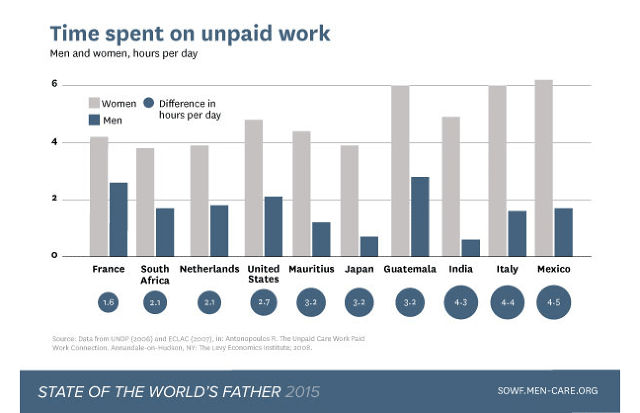Report: Involved fathers critical to gender equality

BPC Staff Jun 22, 2015 | 1:00 pm
1 min read time
353 wordsAll Latest News, Lift IOWA, Women’s and Gender Issues|
BY LIFT IOWA STAFF | @LiftIOWA
Encouraging men to become more involved as fathers is the key to achieving gender equality, according to a landmark international study that shows women remain overwhelmingly more responsible for child care and domestic duties despite their increasing role in paid employment.
Last week, a new report on fatherhood was revealed at the United Nations in New York with the help of Chelsea Clinton. The 288-page report, titled “State of the World’s Father,” analyzed 700 studies on the subject from every nation for which data are available. The report covers the impact of men’s reluctance to share the workload at home and the consequences for a child of having a violent father, and suggests that engaged fathers enjoy better health and a more productive life, Fast Company reports.
Despite now making up 40 percent of the formal global workforce, women still spend between two and 10 times longer than men caring for children or the elderly, the Guardian reported, and there is no country where men and boys share unpaid domestic and care work equally with women and girls.
The Guardian also noted one study cited by the report, which found that even between 1965 and 2003, married, employed men in 20 industrialized nations, including the United Kingdom and the United States, contributed on average an extra six hours a week to domestic chores.
While the report highlights suggestions for change, including more ambitious paternity leave, the report ends on what Fast Company calls a “crushing note”: If you’re hoping to see gender equality in your lifetime, it suggests, don’t hold your breath.
Eighty-eight percent of women ages 30-39 saw their earnings decline when they had children, according to the Guardian’s report. And of the 500 largest corporations in the world, just 23 have a female CEO. Women earn, on average, 24 percent less than men because of their burden of care work.
The change might take more than one generation to come. Gary Barker, one of the lead authors of the report, expects change in 30 to 40 years. |










